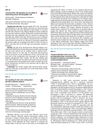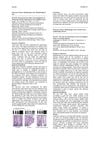 1 citations,
September 2016 in “Journal of Dermatological Science”
1 citations,
September 2016 in “Journal of Dermatological Science” FGF18 treatment during hair's resting phase can protect against hair loss from radiation.
 31 citations,
February 2019 in “International Journal of Cosmetic Science”
31 citations,
February 2019 in “International Journal of Cosmetic Science” Caffeine applied to the scalp can protect hair follicles from UV damage.
25 citations,
April 2012 in “Veterinary and comparative oncology” Megavoltage radiation therapy extended survival in rabbits with thymomas, especially in those weighing more than 1.57 kg.
 January 2024 in “Journal of cosmetic dermatology”
January 2024 in “Journal of cosmetic dermatology” Silibinin-loaded micelles significantly protect hair from UV-B damage.
 53 citations,
January 2009 in “Journal of Investigative Dermatology”
53 citations,
January 2009 in “Journal of Investigative Dermatology” UVB radiation harms hair growth and health, causing cell death and other changes in human hair follicles.
 April 2018 in “Radiotherapy and Oncology”
April 2018 in “Radiotherapy and Oncology” Mitochondria may influence how cells respond to radiation, affecting nearby non-irradiated cells.
 131 citations,
October 2004 in “Clinical Cancer Research”
131 citations,
October 2004 in “Clinical Cancer Research” Tempol is safe and may prevent hair loss from brain radiotherapy.
 25 citations,
September 2013 in “Journal of thoracic oncology”
25 citations,
September 2013 in “Journal of thoracic oncology” Soy isoflavones can protect lung tissue from radiation damage.
10 citations,
June 2003 in “PubMed” Radiation increases cell death in hair follicles, but certain treatments can protect against this effect.
1 citations,
November 2022 in “International journal of molecular sciences” Human fetal placental stromal cell injections speed up healing and improve skin and hair recovery after radiation damage.
 April 2022 in “Anti-cancer agents in medicinal chemistry”
April 2022 in “Anti-cancer agents in medicinal chemistry” Some existing medicines show promise as safe treatments to protect against the side effects of radiation therapy.
 November 2019 in “Neuro-oncology”
November 2019 in “Neuro-oncology” Rind-based techniques can lower scalp radiation dose and reduce hair loss in brain cancer treatment.
September 2016 in “Journal of dermatological science” FGF18 helps hair follicles resist radiation by stopping hair growth cycles.
29 citations,
July 2013 in “Journal of Investigative Dermatology” UV radiation causes skin cancer, but sunscreens and certain drugs can help prevent it.
7 citations,
January 2001 in “Comprehensive series in photosciences” UV radiation significantly damages hair, especially with humidity, making it more vulnerable to further damage.
 70 citations,
July 2020 in “Pharmacological Reports”
70 citations,
July 2020 in “Pharmacological Reports” Cepharanthine, a Japanese hair loss drug, shows promise as a COVID-19 treatment but needs more testing.
24 citations,
November 2015 in “Frontiers in Genetics” Nitroxide drugs can safely and effectively treat age-related diseases like macular degeneration and cardiovascular issues.
 13 citations,
May 2020 in “Journal of Plastic Reconstructive and Aesthetic Surgery”
13 citations,
May 2020 in “Journal of Plastic Reconstructive and Aesthetic Surgery” Botulinum toxin's effectiveness for treating scalp alopecia is not well-supported due to insufficient data.
 July 2021 in “IntechOpen eBooks”
July 2021 in “IntechOpen eBooks” Ginseng, especially its component ginsenosides, can promote hair growth, reduce hair loss, and potentially treat conditions like alopecia by affecting cell pathways and cytokines.
June 2021 in “International journal of cosmetics and dermatology” Vitamin C and E may help with certain skin and hair conditions, but more research is needed to confirm their effectiveness.
 September 2019 in “The journal of investigative dermatology/Journal of investigative dermatology”
September 2019 in “The journal of investigative dermatology/Journal of investigative dermatology” Hair follicles repair 3D injuries using a 2D healing process.
 252 citations,
January 2008 in “Trends in Endocrinology and Metabolism”
252 citations,
January 2008 in “Trends in Endocrinology and Metabolism” Melatonin in the skin helps protect against damage from stress and UV rays, and could be used to treat certain skin conditions.
 127 citations,
January 2015 in “Journal of Biological Rhythms”
127 citations,
January 2015 in “Journal of Biological Rhythms” The skin's internal clock affects healing, cancer risk, aging, immunity, and hair growth, and disruptions can harm skin health.
 November 2020 in “Journal of The American Academy of Dermatology”
November 2020 in “Journal of The American Academy of Dermatology” Taking vitamin C and vitamin E twice a day can help prevent sunburn and DNA damage from UVB exposure.
 44 citations,
October 2019 in “International Journal of Molecular Sciences”
44 citations,
October 2019 in “International Journal of Molecular Sciences” Melatonin, usually known for sleep regulation, also has antioxidant properties that can protect skin, stimulate hair growth, and improve skin conditions, with topical application being more effective than oral use.
 61 citations,
January 2013 in “Indian Journal of Dermatology, Venereology and Leprology”
61 citations,
January 2013 in “Indian Journal of Dermatology, Venereology and Leprology” Hair usually grows back 1-3 months after treatment for anagen effluvium, and children with Loose Anagen Hair Syndrome often improve by adolescence.
 45 citations,
January 2020 in “Pharmaceutical Biology”
45 citations,
January 2020 in “Pharmaceutical Biology” Dendrobium officinale polysaccharides may help with hair growth, skin moisturization, and protection against oxidative damage.
6 citations,
March 2022 in “International journal of molecular sciences” Natural skincare products may help reduce sun damage and support the skin's daily cycle.
 October 2021 in “Nepal journal of dermatology, venereology & leprology”
October 2021 in “Nepal journal of dermatology, venereology & leprology” Melatonin is good for skin health and may help treat skin conditions.
 October 2007 in “Journal of Investigative Dermatology”
October 2007 in “Journal of Investigative Dermatology” The meeting highlighted the genetic basis of female pattern hair loss and various skin health insights.





















